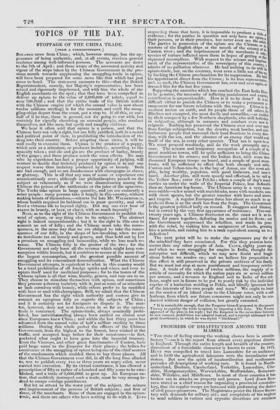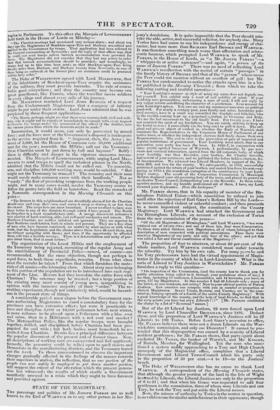PROGRESS OF DISAFFECTION AMONG THE MASSES.
"Tun state of feeling among the working classes here is unsatis- factory "—such is the report from almost every populous district in England. Through the entire length and breadth of the country, discontent of a formidable character is known to exist. In 1819, HUNT was compelled to travel into Lancashire for an audience; and in 1S30 the agricultural labourers were the incendiaries and rioters. But now the spirit of insubordination and restlessness pervades all descriptions of working men. It is found in North- umberland, Durham, Cumberland, Yorkshire, Lancashire, Che- shire, Montgomeryshire, Warwickshire, Staffordshire, Somerset- shire, Wiltshire, and Middlesex. In most of these counties it has broken out in attacks on property and person. Lord Jona Res- sELL stated as a chief reason for organizing a provincial constabu- lary, that the regular troops are harassed with performing the duties of civil peace-preservers. The Magistrates pester the Home Secre- tary with demands for military aid ; and complaints of his neglect to send soldiers in various and opposite directions are common
topics in Parliament. To this effect the Marquis of LONDONDERRY held forth in the House of Lords on Monday— "The Chartist meetings had occasioned very serious alarm ; and about ten days ago the Magistrates of Stockton-upon-Tees and Durham assembled and 8p died to the Government for troops. '[hat application had been referred to tli! General commanding at Newcastle ; and the reply of that officer was, that he could not send troops unless lnrraek accommodation were provided for them. The illagistrates did mot consider that they had any power to order that that barrack accommodation should be provided; awl accordingly, no troops had up to this time been sent ; so that Stockton-upon-Tees being fircot). miles from Durham, and Durham twenty from Newcastle, in case of there being an outbreak at the former place no assistance could be procured within forty miles." The Duke of WELLINGTON agreed with Lord MELBOURNE, that if the inhabitants of Stockton-upon-Tees require the assistance of the military, they must provide barracks. The rule of course holds good everywhere ; and thus the country may become one great guardhouse, like Prussia, where the traveller meets soldiers in every village and almost every mile of his journey. 111r. Mssnuxxoss reminded Lord JOHN RUSSELL of a request from the Cockermouth Magistrates that a company of intinstry might be put under their orders. Lord JOHN admitted that he was perplexed by these frequent applications-
" The noose, perhaps, might see that there were reasons, both civil and mili- tam why it might not be expedient immediately to comply with every request to disnerse the troops under the conmend of the officer of the district, into the various places front which the demands might be made."
Insurrection, it would seem, can only be prevented by armed force; and the force now at the Government's disposal is inadequate to the service required from it. " Augment, then, the Army ; in- stead of 5,000, let the House of Commons vote 50,000 additional men for the year ; assemble the Militia • call out the Yeomanry : these Chartists must be put down by ball and bayonet." Softly : there is difficulty and danger in the vigorous measures recom- mended. The Marquis of LONDONDERRY, while urging Lord MEL- BOURNE to send troops to quell the turbulent pitmen in the North, admitted that the Militia could not he called out. To assemble, arm, and discipline 100,000 working men, would be suicidal. " But might not the Yeomanry be trusicd ? The tenantry and their sons would surely make common cause with their landlords." Not so "surely:" the fear of provoking vengeance front the working people might, and in many Cases would, render the Yeomanry averse to follow the gentry into the field as heretofore. Read the remarks of a Newcastle correspondent in the Morning Chronicle on this point— "The farmers in this neighbourhood arc dreadfully alarmed lest tlw Chartists should come and reap their corn, and carry it away or destroy it, as has been threatened. The crops here are most luxuriant. I never recollect to have seen them better in any of the districts through which I have passed. The North Is altogether in a must unsatisfactory state. A savage discontent animates a rant number of bard-working able, and well-paid ineehanies and miners. The Northern Chartists are nciii:er indolent nor ignorant. They are superior to their Southern confHerates, both in minds and persons. They are a tine class of men, who have become convinced, no matter by what means or with what truth, that the Legislature and the classes shove them have ill-used them, and are without sympathy with them ; and they, if the opportunity be afforded them, will take a terrible revenge. There is a determination and unity of pur- pose about them, that is most serious."
The organization of the Local Militia and the employment of the Yeomanry being rejected, recruiting of the regular Army and the establishment of Provincial Police—armed, of course—are recommended. But the same objection, though not perhaps in equal force, to both these expedients, remains. From what class must the recruits be taken ? From that which furnishes the mate- rials of all armies—the labouring class. About sixty amen belonging to this portion of the population are to be introduced into each regi- meat of the Line. Beware lest. they inoculate the entire force with Chartism ! The veterans may be trusted ; but a large portion of the existing army must consist of young men, sympathizing in opinion with the immense majority of their order." The re- cruiting experiment, though not extensively tried, would be hazard- ous in the present state of things.
A considerable period must elapse before the Government mea- sure authorizing Magistrates to enrol a constabulary force for the provinces can have extensive effect ; but were it practicable to raise and discipline 5,000 or 10,000 policemen before next winter, is more reliance to be placed upon a Policeman with a blue coat and sabre, than in a Militiaman with a red coat and musket ? The Metropolitan Police, like the regular troops, were brought together, drilled, and disciplined, before Chartism had been pro- pagated far and wide ; but both bodies must henceforth be re- cruited from Chartists. Herein lies a principal difference between the popular discontent of the present and of 6.)rmer times. Now, all descriptions of working men arc exasperated and feel •essTieved ; formerly, the peasantry could be relied upon to quell rioters and Democrats in the manutiteturing districts, and the Yeomanry feared not the torch. To those unaccustomed to observe the important changes gradually effected in the feelings of the masses towards their superiors in station, the reflection, that no one portion of the people can now safely be employed to put down another portion, will suggest the extent of the alteration which the present genera- tion has witnessed ; the results of which startle a Government manifestly unequal to a crisis which they ought to have foreseen and provided against.



























 Previous page
Previous page